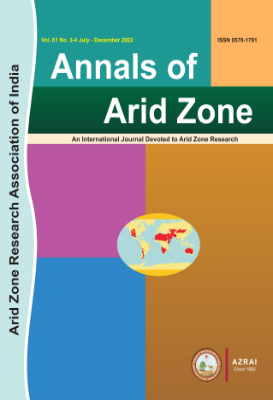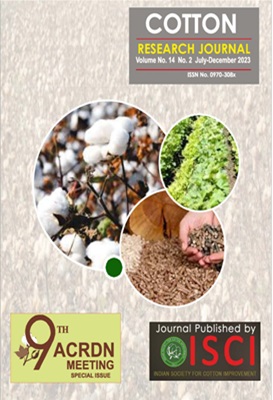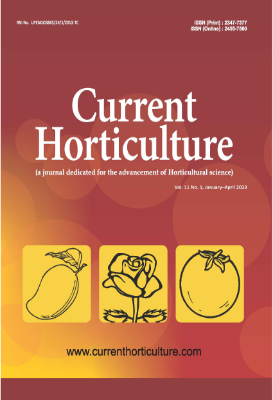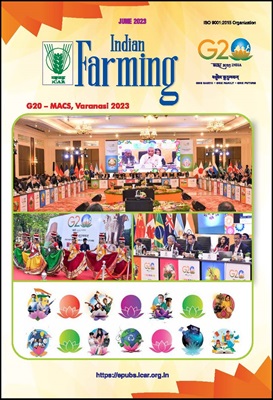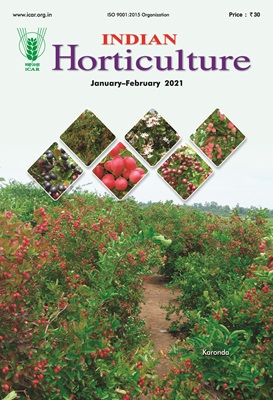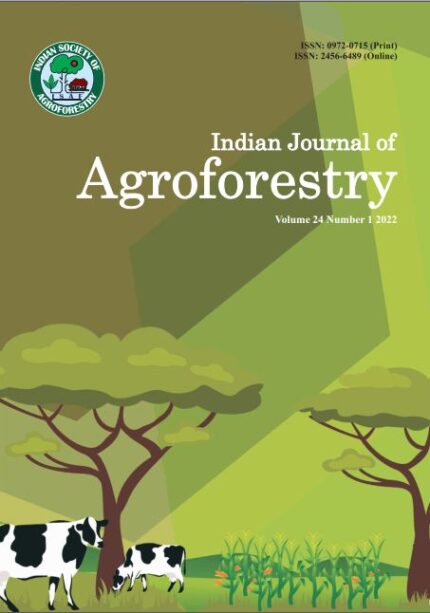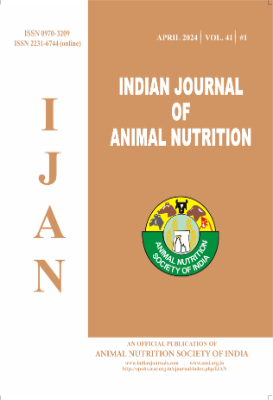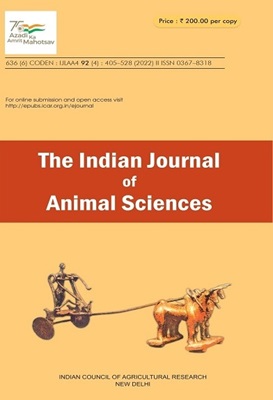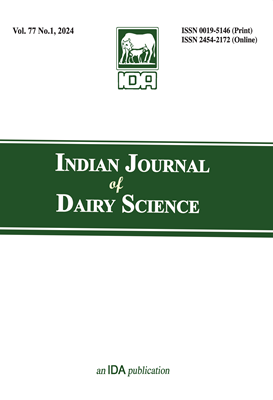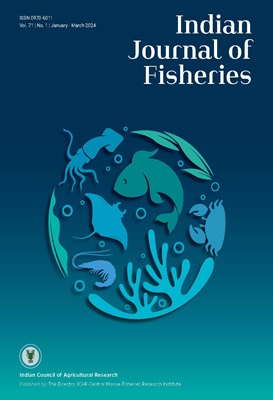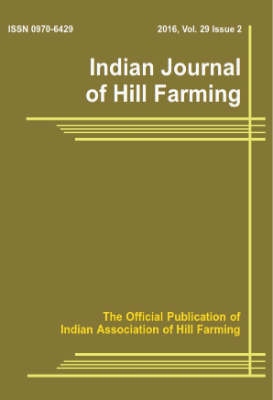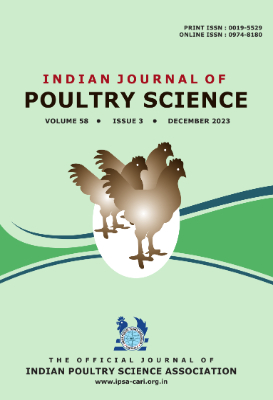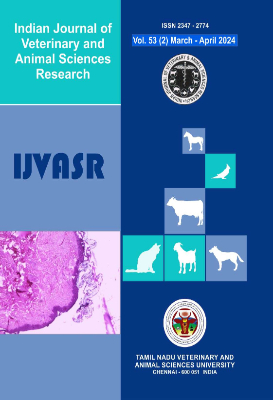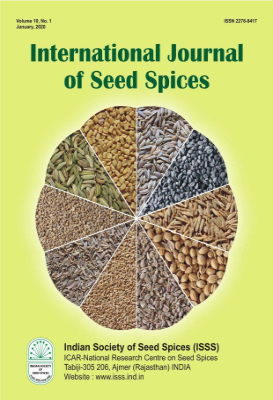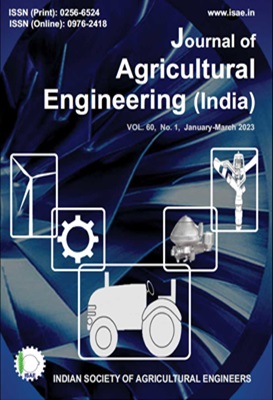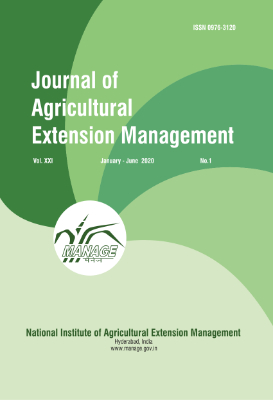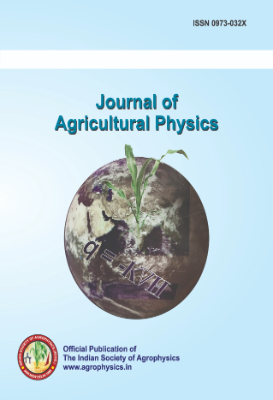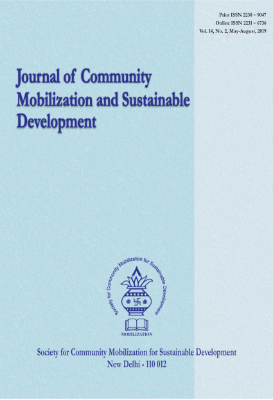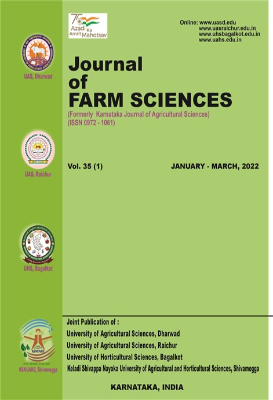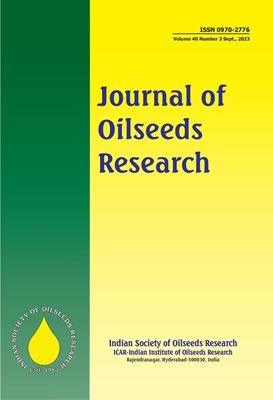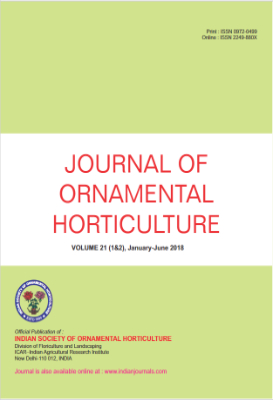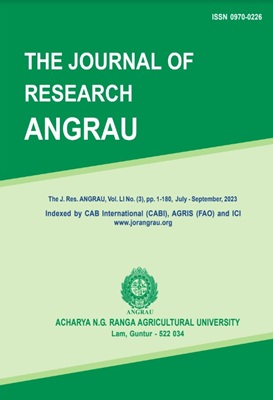E-Resources
Agricultural Economics Research Review
Focus and Scope The Journal regularly publishes refereed research articles, reviews, research notes and communications of high impact in basic and applied research on economic and policy aspects of agriculture and rural development. Comprehensive review articles in the area of agricultural economics (including livestock, horticulture and fisheries), conference/symposia proceedings and book reviews are also published in the Journal. To encourage the young researchers, recent abstracts of M.Sc. and Ph.D. theses in agricultural economics and policy research are also published. Peer Review Process Preliminary Scrutiny The Journal has a Preliminary Review Committee comprising Members of Editorial Board and Executive Committee, which makes preliminary evaluation of the merits of a paper in terms of sending to a referee or rejection at the preliminary stage itself. Open Access Policy This journal provides immediate open access to its content on the principle that making research freely available to the public supports a greater global exchange of knowledge. Sponsors Indian Council of Agricultural Research Journal History The journal Agricultural Economics Research Review is being published regularly since 1988.
Annals of Agricultural Ressearch
The Indian Society of Agricultural Science was established in 1979. The Society is an umbrella society which provides an opportunity to agricultural scientists belonging different disciplines to address the problems confronting Indian agriculture in a concerted and integrated manner. The name of the Society shall be "THE INDIAN SOCIETY OF AGRICULTURAL SCIENCE (ISAS)". The head office of the Society shall be at the Indian Agricultural Research Institute, New Delhi-I 10 012.
Annals of Arid Zone
Focus and Scope The Annals of Arid Zone is a open access journal totally devoted to dryland and arid zone research. The Journal accepts the original research and review articles covering diverse fields like dryland agriculture, crop management, soil-plant-water relationship, range ecology and management, solar energy utilization, desertification, rangelands, sand dunes, livestock, agroforestry, wind erosion, watershed management, biodiversity, integrated farming systems, climate change, hydrology, etc. publishes the findings of research relevant to dryland in general and arid zone (hot and cold) in particular. Peer Review Process The research/ review article within one week of its submission is sent to two different independent referees. They are selected on basis of their expertise in areas of paper received, have ability to logically comments based on the content, with no conflicts of interest and also reliable to do review in the given timeframe. Referees are expected to respond to the editor's request for advice within a limited period of time (3 weeks), which is clearly stated by the editor. A comment sheet is also provided to him for seeking his advice on all aspects of the article. He is advised to return the manuscript immediately without comments if it is not possible for him to attend to a manuscript within this period, so that the editor can send it to another referee without further delay. Generally 6 weeks' time is given to the each reviewer for completion of review the research article. Comments from the referee are received by the editor within the stipulated timeframe If the reports of both referees disagree with regard to the suitability of the paper for publication, advice of a third referee is sought. Comments received from both referees: Article is sent to author for modification along with comments of referees. At this stage editor completes the preliminary editing. It includes checking in-house style (presentation of title, affiliations, present address, abstract, scientific nomenclature, text and reference presentation as per the Journals' format). Comments not received from both referees: If comments are not received from both referees within the stipulated timeframe, reminder is sent to them. Reminder to referee from whom the comments not received: If comments are not received from either of the one referee within the stipulated timeframe, reminder is sent to him. However if his reply is not coming in a stipulated time, editor takes suitable action on the basis of comments received from one referee. In case of no reply from both the referees the article is sent to a new referee. Rejection of the article on the basis of comments of referees: The article is rejected on the basis of comments of referee/referees. The author is informed accordingly. Author does not agree with the adverse comments of one referee or in the meantime suitable comments are received from Second referee: Editor's decision independently or in consultation with editorial board, is final. Editor may ask the first referee or a third referee to go through the comments of first referee, reply of author to comments of referee and /or contradictory comments of second referee. Favorable comments are received from second referee after the modification: Input of the second referee is incorporated in modified article. Author is contacted if referee asks for inclusion of more information in the form of table, figs or references. Adverse comments received from the second referee at any stage: Author is informed of the adverse comments from second referee and action is stalled (even at proof stage) till final decision. Editor's decision independently or in consultation with editorial board, is final. Acceptance of the article is sent to author. Plagiarism: Plagiarism will be checked by iThenticate software. Articles/ manuscripts with text resemblance less than 20 % (excluding standard text in methods and references in text as well as bibliography) will be only be excepted for publication. Publication Frequency The journal is published quarterly. Open Access Policy The Journal is available as Open Access under the Creative Commons Attribution-Non Commercial-Share Alike 4.0 International License. Ethical Policy Our interaction with our authors is built upon a foundation of trust, and we operate on the principle of good faith when it comes to publishing submitted materials. We uphold the belief that every author, referee, and editor should openly disclose any conflicting or competing interests tied to a specific article. Our evaluation of manuscripts is impartial, irrespective of authors' attributes such as race, gender, religious beliefs, ethnicity, citizenship, age, or reputation. We exclusively consider fresh submissions that have not been previously published or simultaneously submitted elsewhere. It is imperative that the reproduction of content from other papers be accompanied by appropriate source credits, and any form of plagiarism, whether it involves the uncredited use of external text or the creation of multiple papers with substantially similar content by the same authors, is strictly prohibited and is sole responsibility of the author. Simultaneous submission of identical findings to multiple journals is deemed unethical, with exceptions granted to review articles that include proper citations. Authors are responsible for acknowledging the contributions of other researchers that have influenced their research and should duly reference the publications that have shaped the trajectory and progress of their study The Publisher will address the matters related to authorship and contributorship, managing complaints and appeals, addressing allegations of research misconduct, handling conflicts of interest, ensuring ethical oversight, addressing intellectual property rights (IPR) concerns, facilitating post-publication discussions, and managing corrections and retractions. Throughout this process, we adhere to the guidelines set forth by the Committee on Publication Ethics (COPE) Sponsors ICAR-Central Arid Zone Research Institute, Jodhpur-342003 Journal History The Arid Zone Research Association of India, Jodhpur (India) (AZRAI; Regd No: 17988/69) was formed in 1962 to disseminate research findings related to a variety of issues through interdisciplinary researches concerned with the development of arid zone. A quarterly journal, Annals of Arid Zone was started in 1963. Recently the association has published 54th volume of Annals of Arid Zone in 2015.
Cotton Research Journal
One of the early actions of ISCI has been the launching of a research journal to fill the vacuum created by the stoppage of predecessors like (a) the Indian Cotton Growing Review published by the Imperial Cotton Growing Corporation of UK and (b) the Indian Cotton Development Journal published by the Directorate of Cotton Development. For many decades, these journals had remained as vehicles for research findings on cotton production technologies in India. By 1970 both these journals ceased to appear. The inaugural issue of the ISCI Journal was published in January 1976, since then the periodical has witnessed increasing patronage from cotton scientists from all over India and abroad. By 1990s, the 6- monthly journal had transformed into a quarterly publication to accommodate the rising number of articles originating from ICAR institutes and agricultural universities in which government funded research programmes were on the increase.
Current Horticulture
Since its establishment in 2013, 'Current Horticulture' has been a cornerstone publication in the field of horticultural science. Published by the Society for Horticultural Research and Development, the journal has played a pivotal role in advancing knowledge and fostering collaboration within the horticultural community. With its inaugural issue marking the beginning of a journey towards excellence, 'Current Horticulture' has consistently upheld a commitment to quality and innovation. Over the years, the journal has evolved into a platform where researchers, scientists, academicians, and stakeholders converge to share their latest findings, insights, and advancements in various facets of horticulture. From plant cultivation techniques to breeding methodologies, from genetics to pest management strategies, each issue of 'Current Horticulture' showcases a diverse array of articles that contribute to the collective understanding of horticultural practices. Its publication schedule, releasing three issues annually in April, August, and December, ensures a steady flow of cutting-edge research to the global horticultural community. Through its dedication to excellence, 'Current Horticulture' has earned recognition as a leading publication in the field, driving innovations and shaping the future of horticultural research and development. The journey of 'Current Horticulture' since its inception in 2013 exemplifies a commitment to scholarly excellence and advancement in horticultural science. As a publication of the Society for Horticultural Research and Development, the journal has served as a beacon of knowledge dissemination, providing a platform for researchers and practitioners to share their insights and discoveries. With its inaugural issue, the journal embarked on a mission to elevate the discourse surrounding horticulture, covering a wide range of topics including plant cultivation, breeding, genetics, pest management, and post-harvest technology. The triannual publication schedule, releasing issues in April, August, and December, ensures a regular influx of cutting-edge research from around the globe. 'Current Horticulture' has become synonymous with quality and rigor, attracting submissions from esteemed scholars and experts in the field.
Indian Farming
This magazine is for people interested-in-farming. The aim is to present scientific information in a popular style to the progressive farmers and people interested in application of science to day-to-day problems to Indian farming. It has articles, book reviews, photo features, interviews, success stories and an editorial page. Two special issues are also brought every year. One in October on World Food Day and another on any special occasion; accent issues are also brought out on subject of topical issues. It is most authoritative and popular farming magazine in India published since 1940.
Indian Journal of Agroforestry
Focus and Scope The Indian Journal of Animal Production and Management publishes original research and review papers in all applied aspects of animal production management. Peer Review Process Double-blind reviewing procedure is followed for each paper. Publication Frequency The journal is published quarterly (4 issues per year). Ethics Policy Manuscripts submitted to the journal are evaluated on the basis of their scientific content. Measures are adopted to uphold the standards of publication ethics and to avoid malpractices. We ensure that the papers submitted and their work is original and unpublished, and is not submitted for publication elsewhere. In addition, authors certify that their research paper is their own original work, that is neither copied or plagiarized, partly or whole, from other works, and that the works of others are appropriately cited or quoted. Open Access Policy This is an open access journal which means that all content is freely available without charge to the user or his/her institution. Users are allowed to read, download, copy, distribute, print, search, or link to the full texts of the articles, or use them for any other lawful purpose, without asking prior permission from the publisher or the author. This is in accordance with the BOAI definition of open access. Licence Attribution-NonCommercial 4.0 International (CC BY-NC 4.0) Copyright Notice Copyright lies with the publisher. Privacy Statement The names and email addresses entered in this journal site will be used exclusively for the stated purposes of this journal and will not be made available for any other purpose or to any other party. Archiving All published journal content shall be automatically preserved in the PKP Preservation Network (PKP|PN). Sponsors Indian Society of Animal Production and Management Journal History The journal was started in the year 1986 by the Indian Society of Animal Production and Management with aim to publish original research work in the area of livestock production management. The first issue was published in the year 1986 by Department of Livestock Production and Management, Haryana Agricultural University, Hisar, Haryana. The founder editor of the Journal was Dr. N. S. R. Sastry.
Indian Journal of Animal Nutrition
Focus and Scope The Indian Journal of Animal Nutrition (IJAN) publishes original papers on research in the fields of animal nutrition, feed technology, feed evaluation and conservation, physiological and biochemical aspects including microbiology, biotechnology, feed and fodders and other relevant areas related to livestock feeding in developing and tropical regions. Papers describing research on given areas for ruminants and non-ruminants are welcome. The Journal is a forum for presenting peer reviewed articles on basic and applied research. Submissions addressing the new frontiers of the subject including emerging areas of nutritional genomics, modelling and interface topics such as soil plant animal and ecosystem interrelationships are given priority. Reviews on specialized topics are also included. The IJAN is published quarterly since its inception in 1983 under the aegis of Animal Nutrition Society of India (ANSI) having about twelve hundred life members around the world. ANSI has instituted two awards to be given to two selected papers published in the Journal during the biennial conferences. Peer Review Process All the manuscripts are submitted to chief editor and thereafter sent for evaluation/comments/recommendations by two referees. The papers are processed as per the recommendations of the referee and editorial board. The papers are rejected if not found suitable for publication or out of scope of Journal. Publication Frequency The journal is published quarterly. Open Access Policy This journal provides immediate open access to its content on the principle that making research freely available to the public supports a greater global exchange of knowledge. Sponsors 1984 Indian Council of Agricultural Research Journal History IJAN is published quarterly since its inception in 1983 under the aegis of Animal Nutrition Society of India (ANSI), having more than one thousand life members around the world.
Indian Journal of Animal Production and Management
Focus and Scope The Indian Journal of Animal Production and Management publishes original research and review papers in all applied aspects of animal production management. Peer Review Process Double-blind reviewing procedure is followed for each paper. Publication Frequency The journal is published quarterly (4 issues per year). Ethics Policy Manuscripts submitted to the journal are evaluated on the basis of their scientific content. Measures are adopted to uphold the standards of publication ethics and to avoid malpractices. We ensure that the papers submitted and their work is original and unpublished, and is not submitted for publication elsewhere. In addition, authors certify that their research paper is their own original work, that is neither copied or plagiarized, partly or whole, from other works, and that the works of others are appropriately cited or quoted. Open Access Policy This is an open access journal which means that all content is freely available without charge to the user or his/her institution. Users are allowed to read, download, copy, distribute, print, search, or link to the full texts of the articles, or use them for any other lawful purpose, without asking prior permission from the publisher or the author. This is in accordance with the BOAI definition of open access. Licence Attribution-NonCommercial 4.0 International (CC BY-NC 4.0) Copyright Notice Copyright lies with the publisher. Privacy Statement The names and email addresses entered in this journal site will be used exclusively for the stated purposes of this journal and will not be made available for any other purpose or to any other party. Archiving All published journal content shall be automatically preserved in the PKP Preservation Network (PKP|PN). Sponsors Indian Society of Animal Production and Management Journal History The journal was started in the year 1986 by the Indian Society of Animal Production and Management with aim to publish original research work in the area of livestock production management. The first issue was published in the year 1986 by Department of Livestock Production and Management, Haryana Agricultural University, Hisar, Haryana. The founder editor of the Journal was Dr. N. S. R. Sastry.
Indian Journal of Animal Sciences
This journal caters to a wide clientele comprising veterinarians, researchers and students. Articles are included on animal breeding and genetics, immunology, biotechnology, diseases, medicine and pharmacology, anatomy and histology, surgery, pathology, physiology, nutrition, milk, meat and other animal products, housing and fisheries from India and internationally.
Indian Journal of Dairy Science
Indian Journal of Dairy Science is a scientific journal of Indian Dairy Association. The objective of the Association shall be the advancement of dairy science and industry, farming, animal husbandry, animal sciences and its branches including dairy farming & research on breeding, and management of dairy livestock.
Indian Journal of Extension Education
The Indian Journal of Extension Education is the open access, indexed, and peer- reviewed official publication of the Indian Society of Extension Education (ISEE), Division of Agricultural Extension, ICAR- Indian Agricultural Research Institute, New Delhi 110012, INDIA. The focus subject areas of the Indian Journal of Extension Education include; Agricultural Extension, Agricultural Communication, Agricultural Entrepreneurship, Extension Management, Agricultural Education, Socioeconomic Studies, Rural Sociology and educational Psychology, Adoption and diffusion of Farm Innovations, Agricultural Diversification, ICT application in Agriculture, Planned Agricultural Change, Agricultural & Rural Development, and Contemporary Agricultural Extension issues related to Agricultural Science/ Dairying / Communication/ Home Science / Fisheries / Veterinary and allied social sciences. The Indian Journal of Extension Education publishes peer-reviewed original manuscripts in the field of extension education and allied fields. The journal accepts original research papers, research tools, and research notes only. The Indian Society of Extension Education, New Delhi is the publisher of the Indian Journal of Extension Education.
Indian Journal of Fisheries
The Indian Journal of Fisheries is published quarterly by the Indian Council of Agricultural Research (ICAR). Original contributions in the field of fish and fisheries science will be considered for publication in the Journal. The material submitted must be unpublished and not under consideration for publication elsewhere.
Indian Journal of Hill Farming
Focus and Scope The Indian Journal of Hill Farming (Indian J Hill Farming) is the official organ of the Indian Association of Hill Farming, Umiam, Meghalaya, India and is devoted to original research report on all aspects of Agriculture, Animal Husbandry, Fisheries, Forestry, Ecology and other related fields of biology pertaining to Hill Farming. The Journal published twice a year, includes communications in form of research papers, review papers, short notes and book reviews, primarily from members. In addition, articles of exciting research and general interest are also accepted for publication. However, popular articles are generally not accepted. Every issue also contains some review articles on actual problems / future research possibilities / status of research, education and development. All contents are in the English language and subject to peer review. Peer Review Process All manuscripts are reviewed by an editor and/ members of the Editorial Board to assess whether the manuscript is fit for outside review. Generally, manuscripts are sent to two reviewers, and if required, to a third reviewer. Decisions will be made as rapidly as possible, and the journal strives to return reviewers? comments to authors within 4 ? weeks. Manuscripts sent to authors for revision should be returned within 2 weeks; otherwise, they will be treated as new submissions. The Editorial Board including copy editors will re-review manuscripts that are accepted pending revision. Best efforts are made to publish manuscripts online within 8 weeks after submission. Open Access Policy IJHF will be published freely online (till the December 2013 issue). Authors can freely download the PDF file from which they can print unlimited copies of their articles. From June 2014 issue, full text would be available to members only. Members would be asked to register and obtain login details. Individual articles can be downloaded by non-members on payment basis. Sponsors Indian Association of Hill Farming Journal History The journal was first published in the year 1987. The journal is published twice a year (June and December). Current NAAS rating of the Journal is 2.9
Indian Journal of Poultry Science
Established in 1965, Indian Journal of Poultry Science (IJPS), a leading peer-reviewed Indian journal in the field is an official publication of the Indian Poultry Science Association (IPSA), Izatnagar-243 122 (UP). The publication is aimed at providing access to academicians, researchers and industry professionals from across the globe to publish their work on all aspects of poultry science through research papers, short communications and review articles. The journal is published three times in a year as one volume in April, August, and December and circulated to IPSA members free of cost. Till date 58 volumes each with 3 issues have been published.
Indian Journal of Veterinary and Animal Sciences Research
Focus and Scope The Indian Journal of Veterinary and Animal Sciences Research published six times (bi-monthly) in a year, considers original papers for publication on all aspects of Veterinary, Animal, Fisheries, and Food sciences (related to animal products). Peer Review Process In the first phase, the suitability of the manuscript received through the online epubs portal of ICAR will be assessed by the experts on the editorial board of the journal. The qualified manuscripts will be made anonymous and sent to two referees at the national level for review. The manuscripts corrected by referees are sent back to the author for revision. The corrected manuscript will be reviewed by the Editorial Board and technically qualified manuscripts will be accepted and scheduled for publication. Open Access Policy This journal provides immediate open access to its content on the principle that making research freely available to the public supports a greater global exchange of knowledge. Sponsors Tamil Nadu Veterinary and Animal Sciences University, Chennai 600 051 Journal History The Indian Journal of Veterinary and Animal Sciences Research (IJVASR) has been published since 1972, initially under the name 'Cheiron' until 2005, and later as the 'Tamil Nadu Journal of Veterinary and Animal Sciences'. In 2014, the journal adopted its current name to reflect its national relevance and improve visibility. In its current format, IJVASR now publishes review articles, peer-reviewed research articles, short communications, and case reports.
Indian Journal of Veterinary Medicine
Focus and Scope Indian Journal of veterinary Medicine published twice in a year The journal publishes review article(invited),original /applied research, clinical reports short communications on all area of animal health including diagnosis treatment and control. Peer Review Process All articles submitted for publication under goes a peer review process by the expert reviewer of the area. To make the review process more transparent Authors name and affiliation were keep in confidence. Based on the comments the articles are either revised or rejected. The revised article further examined by the editorial board. Journal History This Journal is being published regularly since 1981.
International Journal of Seed Spices
The International Journal of Seed Spices is published by the Indian Society for Seed Spices half yearly basis with the aim to provide an appropriate platform presenting well considered, meaningful, constructively thought provoking, non-political and non-controversial but critically analyzing and synthesizing present and future aspects of research on seed Spices and related commodity reference to our country and rest world. The contributors are expected to highlight various issues of irrigation, management, soil, agronomic practices, precision agriculture, breeding, post harvest, IPM, climate change along with meaningful suggestions for solution, refinement and innovations.
Journal of Agricultural Engineering
The subject matter reflects the full range and interdisciplinary nature of research in engineering and physics for agriculture. Manuscripts describing engineering innovations for field crops, horticulture, livestock and fisheries and those reporting research seeking to understand and model the physical processes underlying agricultural systems are welcome.
Journal of Agricultural Extension Management
Focus and Scope The Journal of Agricultural Extension Management (JAEM) disseminates information on extension systems and practices, extension research, efficient organization of technology transfer and other socio-economic issues concerning agriculture and allied areas. Papers on original research in the field of agricultural extension and allied sectors, covering new developments, concepts and their application in effective extension work are accepted for publication. Peer Review Process All papers submitted to the Journal of Agricultural Extension Management (JAEM) are subject to a masked peer review. The article is sent to one reviewer who is selected based on his or her expertise on the subject, research in the area and experience. The criteria for evaluation of articles in the Journal of Agricultural Extension Management are topicality, clear and logical analysis, sound methodology, fairly good English and contribution to knowledge. The Editor reserves the privilege of editing the manuscript, returning it to the author for revision or rejecting any manuscript as unsuitable in topic, style or form with or without requesting external review. Publication Frequency The journal is published half-yearly in June and December. Publication Ethics and Malpractice Statement The Journal of Agricultural Extension Management (JAEM) is a peer-reviewed journal. The responsibilities of the authors, editors and reviewers involved in publishing this journal are indicated here. All papers submitted to the Journal of Agricultural Extension Management are subject to a masked peer review. JAEM does not levy any charges to authors for submission, processing, or publication of articles in the Journal. Authors submitting an article to the journal must declare that (1) they are authors of the article in the order in which listed; (2) the article is original and represents their contributions and has not been copied or plagiarized in whole or in part from other works; and (3) the article has not been published and has not been submitted for publication elsewhere. In cases of proven research misconduct or plagiarism, the publisher, in collaboration with the editors, will take measures to clarify the situation and amend the article. This includes the publication of a correction, clarification or retraction of the work. Responsibility of Authors Authors should ensure that their work is original. If the authors have used the work of others, this must be appropriately cited or quoted. The responsibility for the accuracy of the information, facts, and citations, lies with the authors of the publication. Each author who submits the manuscript should read the guidelines for submission in the Journal of Agricultural Extension Management. The manuscript must be plagiarism-free. The Corresponding Author should ensure that all co-authors have seen and approved the final version of the paper and have agreed to its submission for publication. Sources of funding for the research reported in the article should be acknowledged at the end of the article. Each article should be accompanied with a declaration by all the authors that (1) they are authors of the article in the order in which listed; (2) the article is original and represents their contributions and has not been copied or plagiarized in whole or in part from other works; and (3) the article has not been published and has not been submitted for publication elsewhere. Authors must also declare that the source of information from other published or unpublished works has been referenced and certify that they are solely responsible for the content of the article and the work included in the article. Authors may be asked to provide the raw data in connection with a paper for editorial review and should be prepared to provide access to such data. Authors should avoid duplication in their submissions i.e. attempting to publish similar manuscripts in more than one journal. Authorship should be limited to those who have made a significant contribution to the conception, design and execution of the study. Responsibility of Editors Manuscripts are evaluated on their topicality, originality of the idea, unique argument or insight; clarity of objectives, sound methodology, clear and logical analysis and depth of discussion, appropriate examples, consistent structure and presentation and contribution to knowledge. JAEM does not consider factors like gender, race, religious beliefs, ethnic origin, citizenship, or political philosophy of the authors. The papers submitted to the journal first will undergo screening for originality in content. If they satisfy this requirement the papers will be further sent to review. Otherwise, the papers will be rejected at the first level. The Editor is solely and independently responsible for deciding which articles should be accepted for publication. The Editor reserves the privilege of editing the manuscript, returning it to the author for revision or rejecting any manuscript as unsuitable in topic, style or form with or without requesting external review. Editors must not disclose any information about a submitted manuscript to anyone other than those involved in the publishing process. Reviewers JAEM maintains confidentiality of the submission. Reviewers remain anonymous to authors. The reviewers do not know the author's identity. The identities of the reviewers are known only to the Editorial Team. Reviewers' comments to the editors are confidential and before passing on to the author are made anonymous. Manuscripts received for review are treated as confidential documents. Reviewers follow a format provided by MANAGE for the review of the articles. A reviewer may inform the Editorial Team about any similarity or overlap between the manuscript under consideration and any other published paper which they know about. Sponsors National Institute of Agricultural Extension Management Journal History The Journal is being published since 2000. From 2000 to 2016 the title was MANAGE Extension Research Review. Subsequently, the title was modified to Journal of Agricultural Extension Management.
Journal of Agricultural Physics
The Journal of Animal Research, which is published half yearly in Print and Electronic form by New Delhi Publisher, accepts exceptionally exciting, novel and timely communications presenting new and original research work for publication keeping in mind the all round welfare of domestic animals including poultry, companion animals, wild animals and experimental models in lab animals. The task of the Journal is to attract the papers on original research articles, short communication and peer reviewed articles from an individuals and organizations of International repute dedicated to animal science, and veterinary science and education. Articles published in the Journal of Animal Research cover a broad range of explorative topics in all subjects of veterinary and animal sciences including animal production, reproduction, growth and Health aspects of domestic animals. This includes veterinary medicine, veterinary surgery, veterinary gynaecology and obstetrics, animal genetics and breeding, animal nutrition, veterinary physiology and biochemistry, veterinary parasitology, veterinary microbiology, veterinary pathology, veterinary pharmacology and toxicology, livestock product and technology, livestock production and management, veterinary public health and hygiene, veterinary anatomy, poultry science, laboratory animals and wild animals. The journal is also focused on research and management of laboratory animals (e.g. rat, mice, rabbit, guinea pig etc.) and wild animals. However, basic types of papers and notes which relate to investigations in a narrow specialized branch of a discipline may not form an appropriate material for this journal. The Journal of Animal Research will publish the reviews, short communication and proceedings of symposia of National and International relevance subject to the final decision of Editor in Chief. National Academy of Agricultural Science (NAAS) Rating 2024: 4.78
Journal of Cereal Research
Focus and Scope The focus of Journal is in cereal research internationally covering all major disciplines of plant breeding, agronomy, pathology, biotechnology, quality and basic sciences etc. Following types of material are considered for publication on meeting the style and requirements of the journal: Articles on original research, not exceeding 4000 words (up to 15 typed pages, including references, Tables, etc. )should be exclusive for the journal. They should present a connected picture of the investigation and should not be split into parts. Complete information of Ph D thesis should preferably be given in 1 article. Short research notes, not more than 1300 words (total 5 typed pages), which deal with (i) research results that are complete but do not warrant comprehensive treatment, (ii) description of new materials or improved techniques or equipment, with supporting data. and (iii) a part of thesis or study. Such notes require no headed sections. Critical research review articles, showing lacunae in research and suggesting possible lines of future work. These are mostly invited from eminent scientists. The research article or note submitted for publication should have a direct bearing on wheat/ barley research or open up new grounds for productive research. Basic type of articles and notes relating to investigation in a narrow specialized branch of wheat may also form an appropriate material for this journal. Peer Review Process An expert in the specific area mandatorily reviews the articles received for publication. The major guidelines for suitability or otherwise of the article are provided to each reviewer. In case of disagreement, the opinion of second reviewer is sought to judge the merit of article. The reviewers are normally given one month time to give their critical comments about the manuscript. Publication Frequency Since 2018, Journal of Cereal Research is published thrice in a year. Open Access Policy This journal provides immediate open access to its content on the principle that making research freely available to the public supports a greater global exchange of knowledge. Sponsors Society for Advancement of Wheat and Barley Research (SAWBAR) Financial Support from Wheat Research and Technology Funds (WRTF) based IIWBR for printing Sources of Support Journal History The JCR (erstwhile WBR / JWR) was started in 2007 and since then biannual issues are published covering different areas of wheat and barley research globally. Since 2018, it is published thrice in a year. In 2019, Journal has been renamed as Journal of Cereal Research(JCR) ISSN : 2582-2675 (erstwhile ISSN: 2249-4065)
Journal of Community Mobilization and Sustainable Development
Focus and Scope The Journal of Community Mobilization and Sustainable Development envisages reorienting the young professionals and researchers for imbibing the values of community participation in research, training and extension efforts. The aim and scope of the journal are: Sharing the relevant experiences and issues related to agriculture and allied fields at the grass root level and global forum to create the necessary academic and development climate. Sensitizing the different stakeholders about the knowledge and innovation management system in pluralistic agri-rural environment. Developing network among the related partners for convergence of their efforts for sustainable academic development of extension education discipline. Peer Review Process The Journal of Community Mobilization and Sustainable Development is a multi-discipline peer reviewed journal and papers are reviewed by one reviewer from the identified panel of reviewers. The reviewers have been identified based on their significant contribution to their discipline. Generally, the reviewing time is 4 weeks. The reviewed papers are referred back to the authors to respond to the suggestions of the reviewers. Open Access Policy This journal provides immediate open access to its content on the principle that making research freely available to the public supports a greater global exchange of knowledge. Sponsors Society for Community Mobilization for Sustainable, Development (MOBILIZATION), New Delhi Journal History Journal of Community Mobilization and Sustainable Development (print ISSN 2230 ? 9047; online ISSN 2231 ? 6736) is published by Society for Community Mobilization for Sustainable Development twice a year since 2006.
Journal of Farm Sciences
Focus and Scope Journal of Farm Sciences (formerly known as Karnataka Journal of Agricultural Sciences) is a quarterly peer reviewed journal devoted to publishing original research / review articles and short communications in fields of Agriculture, Horticulture, Veterinary, Fisheries, Agricultural Engineering, Home Science and allied subjects. Peer Review Process Journal of Farm Sciences is a peer reviewed, open access Journal. It is also recognized by National Academy of Agricultural Science (NAAS). Research papers of Agriculture and its allied sciences including community sciences are being published in the quarterly journal after peer reviewing the articles. Articles will be sent to two referees and based on their recommendation, editorial board take final decision on its publication. It is needless to stress the importance of quality and timely publication. In this context, Editor requests reviewers to offer their valuable technical comments on its suitability or otherwise. If suitable, whether the manuscript is worthy to be published as full length research paper or as a short note in JFS. Requests to return the paper with their comments as soon as possible, preferably within two weeks. The comments may include queries that seek replies from authors to indicate corrections/additions/deletions etc. Open Access Policy This journal provides immediate open access to its content on the principle that making research freely available to the public supports a greater global exchange of knowledge. Sponsors University of Agricultural Sciences, Dharwad University of Agricultural Sciences, Raichur University of Horticultural Sciences, Bagalkot University of Agricultural and Horticultural Sciences, Shivamogga University of Agricultural Sciences Journal History The previous name of the Journal was ''Karnataka Journal of Agricultural Sciences'' (KJAS), which was published from UAS, Dharwad since 1988. Research papers of Agriculture and its allied sciences including community sciences are being published in the quarterly journal after peer reviving the articles. The journal name was changed to Journal of Farm Sciences (JFS) w.e.f. 1.1.2016 obtaining the permission from NAAS, continuing the volume number the previous journal, retaining the present ISSN. Presently JFS is being published as joint publication of four farm Universities of Karnataka state viz., UAS, Dharwad, UAS, Raichur, UAHS, Shivamogga and UHS, Bagalkot. It is a free open access journal since 2007 and uploaded in all above four university websites. The journal is being abstracted /indexed by CAB international and web of science (Clarivate Analytics). The journal is having a NAAS rating of 4.42 since January 2017, with both print and online versions.
Journal of Indian Fisheries Association
Focus and Scope The journal of Inland Fisheries Society of India publishes original research contributions broadly in the field of inland fisheries science. The scope of the journal includes fisheries research on aspects related to inland waters - rivers, reservoirs, floodplain wetlands, estuaries, brackish waters and associated ecosystems. Manuscripts received for consideration will be first screened by the editorial committee for content and overall requirement of the Journal. Those found unsuitable will be returned to the author. Others will be sent to experts in the concerned field for detailed refereeing, with the identity of the author(s) masked. The author(s) will be notified of acceptance, need for revision or rejection of the manuscript. The journal considers article under three broad categories : Research Papers should not exceed 10 pages, including abstract, text (12 pt, double space), tables, figures and references. Short communications should not exceed 4 pages (12 pt, double space), should be a concise information on a particular finding, methodology or comments on recent research publications. Review articles are always asked for from the experts in relevant fields. These may be extended to the maximum of 20 pages, covering critical appraisal of literature on research problems of recent interest. It is mandatory that the author (s) should be the members of the Society. Peer Review Process The journal is a double blind peer reviewed, refereed biannual international journal. The journal welcomes publications of high quality papers. Normally the review system takes 2-3 months time. Sponsors Indian Council of Agricultural Research Journal History The Society regularly brings out a Journal named "The Inland Fisheries Society of India". The 1st Volume was published in December, 1969 and since then made a place among the top fishery journals in the country. The Journal publishes original research works, monographs, invited review articles and books on specialized subjects for exchange and dissemination of information in the country and abroad.
Journal of Oilseeds Research
This scientific and technical journal is dedicated to bring together all persons, organizations and institutions interested in or engaged in the field of oilseeds research, development, oil technology and allied products connected with oilseeds. This would provide the workers a forum for exchange of their views as well as scientific information. The aim of the journal is to promote the dissemination and utility of the scientific information generated in the field of vegetable oil production. Also, the journal periodically publishes the summary of the work carried out in specific fields so that such reviews provide overall idea to the readers interested in a particular field. Direct beneficiaries of the Journal include scientists, technologists, policy makers, industrialists, entrepreneurs interested in undertaking up-scaling of the technologies in the field of oilseeds and allied products. The journal is committed to follow the ethics of scientific publishing and is evolving continuously through adoption of newer monitoring and evaluation schemes. Journal is also committed to up-holding the standard of scientific and professional proficiency as well as research, academic and publication standards.
Journal of Ornamental Horticulture
The Journal of Ornamental Horticulture (ISSN 0972-0499, eISSN 2249-880X) is the peer-reviewed, official publication of the Indian Society of Ornamental Horticulture, (ISOH) New Delhi publishing original research papers/ research notes/ research tools in the field of Ornamental Horticulture and allied fields since 2011. The Indian Society of Ornamental Horticulture, Division of Floriculture & Landscaping, ICAR-Indian Agricultural Research Institute, New Delhi is a registered professional society under the Society Registration Act XXI of 1860 Act 1957 as extended to the Union Territory of Delhi.
Journal of Research ANGRAU
The Journal of Research ANGRAU is the University Publication (quarterly) of Acharya N G Ranga Agricultural University (ANGRAU) and has been published since 1973. This journal is celebrating its 50th volume in the year 2022 and has started only online issue since 2022. The Journal is a double-blind peer-reviewed journal that seeks to encourage research in agriculture, horticulture, agricultural engineering, community science/home science and social sciences (agricultural extension and agricultural economics). The JOR ANGRAU provides a platform to publish original research work in all agricultural and allied sciences. JOR ANGRAU supports research articles which explore innovative experimental approaches and empirical studies. The Journal recognizes works across the above disciplines and therefore especially values meta-disciplinary analyses that will provide a foundation for communication across these academic fields and disciplines. The journal has a NAAS rating of 4.27 (2024) and is a UGC-CARE-approved journal. The Journal is Indexed by CAB International (CABI), AGRIS (FAO) and Indian Citation Index (ICI). Journal has a presence in Google Scholar. The Journal publishes quality research papers in Agriculture and allied sciences after meticulous double-blind peer review process.



